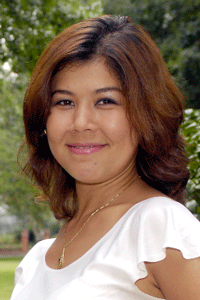Public health career choice evolved from work experience
October 20, 2009

Zebo Ibragimova
In 2003, Zebo Ibragimova found herself with a marketing degree from a leading university, primed to become part of an emerging free market economy in her native Uzbekistan.
That is until she took stock of what her job was all about.
“I found I really didn’t like advertising products that I didn’t think were healthy,” she said.
That epiphany was the first step in a journey that landed her a two-year fellowship to study for a master’s degree in Health Promotion, Education, and Behavior from USC’s Arnold School of Public Health.
Ibragimova is attending USC as an Edmund S. Muskie Graduate Fellow, part of an exchange program established in 1992 in honor of the late Maine senator and U.S. Secretary of State.
The highly competitive program is open to students in 12 Eurasian countries that were part of the former Soviet Union. “It’s a big deal,” said Ibragimova, one of 3,500 students to apply for this year’s Muskie Fellowship class that was winnowed to about 140.
In choosing an advanced degree in HBEB, Ibragimova has finally found a way to utilize her marketing and language skills to help solve pressing health and environmental issues in her native land, a landlocked country about the size of California with a population of some 27 million.
After she declined a marketing job, some American friends invited her to work with them on a rural development project operated by the U.S. Agency for International Development (USAID).
It was her first experience with a non-profit organization and, when the project ended, it provided an easy transition to join a rural water and sanitation project operated by the Swiss Cooperation and Development Agency (SCD).
The project is situated in the rich Fergana Valley region of Uzbekistan where rural few rural residents have access to safe drinking water or adequate sanitation.
As a result, water-borne and hygiene-related diseases (typhoid, diarrhea, hepatitis, dysentery and skin diseases) are widespread and put public health at risk.
Since it began in 2004, the Fergana Valley project has brought potable water to thousands of rural residents. But it became apparent early on that providing clean water alone would not improve the public health picture unless people also changed their hygiene and sanitation practices.
It is important to emphasize fundamental practices like “just washing hands,” said Ibragimova, who supervised a group of hygiene promotion trainers who have worked to change the behavior of local residents, many of whom were accustomed to drawing drinking water from irrigation ditches.
As the hygiene project evolved, Ibragimova realized its impact was important – even life-saving. But she also realized that her on-the-job experience didn’t fully qualify her - there was still much she needed to learn about public health.
When she learned the Muskie Fellowship offered that kind of opportunity, she didn’t hesitate to apply.
Generally speaking, medical care in Uzbekistan is good and most services are provided free of charge, said Ibragimova.
However, by her calculations, health education and prevention efforts make up only about 4 percent of the government’s health care budget.
Ibragimova says she’s going to focus on her HPEB studies for the next two years. Her advisor in that pursuit is Dr. Ken Watkins, graduate director and associate chair of the department.
Her long term goals include both studying for a doctorate in public health and returning home to help strengthen the health promotion efforts of the Uzbekistani government.



_01.jpg)
_02.jpg)